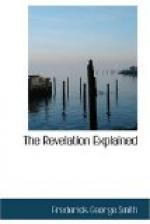When the Lion of the tribe of Juda stepped forward and undertook the task of revealing the secret counsels and purposes of Jehovah to the world, immediately a song of praise ascended from the lips of the redeemed sons of earth. The song was new, adapted to a new theme, and sung on a new occasion. “The four beasts and four and twenty elders fell down before the Lamb, having every one of them harps, and golden vials [censers] full of odors, which are the prayers of saints. And they sung a new song, saying, Thou art worthy to take the book, and to open the seals thereof: for thou wast slain, and hast redeemed us to God by thy blood out of every kindred, and tongue, and people, and nation; and hast made us unto our God kings and priests, and we shall reign on the earth.” This song beautifully expresses the honor due to Jesus Christ in his office-work as Redeemer of the world, by virtue of which people out of every nation, kindred, tongue, and people, are saved unto God and made kings and priests on the earth. The angel who appeared to the Judean shepherds while they were watching their flocks by night, comforted them with the welcome announcement: “Fear not: for, behold, I bring you good tidings of great joy, which shall be to all people. For unto you is born this day in the city of David a Savior, which is Christ the Lord.” Luke 2:10, 11.
Since the preaching of the gospel began, men are instructed to “seek first the kingdom of God” (Mat. 6:33), and they “press into it” (Luke 16:16) by the saving virtue of Him “who hath delivered us from the power of darkness, and hath translated us into the kingdom of his dear Son.” Col. 1:13. Taking our place by the side of the writer of the Revelation, we testify with him that we are already “in the kingdom and patience of Jesus Christ” (Rev. 1:9), and that we “receive abundance of grace and of the gift of righteousness,”




